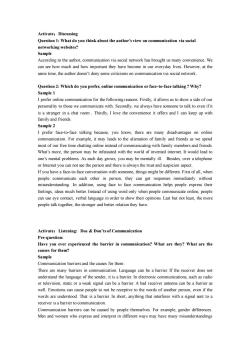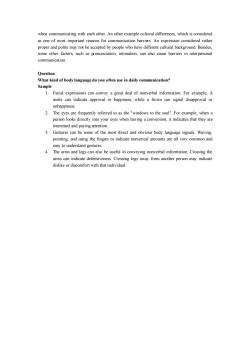《新编大学英语》综合教程(第三版第二册)B2U2_Self-market_Samples

Activate:Discussing Question 1:What do you think about the author's view on communication via social networking websites? Sample According to the author,communication via social network has brought us many convenience.We can see how much and how important they have become in our everyday lives.However,at the same time,the author doesn't deny some criticisms on communication via social network Question 2:Which do you prefer,online communication or face-to-face talking Why? Sample 1 I prefer online communication for the following reasons.Firstly,it allows us to show a side of our personality to those we communicate with.Secondly,we always have someone to talk to even if it is a stranger in a chat room.Thirdly,I love the convenience it offers and I can keep up with family and friends Sample 2 I prefer face-to-face talking because,you know,there are many disadvantages on online communication.For example,it may leads to the alienation of family and friends as we spend most of our free time chatting online instead of communicating with family members and friends. What's more,the person may be infatuated with the world of invented internet.It would lead to one's mental problems.As each day grows,you may be mentally ill.Besides,over a telephone or Internet you can not see the person and there is always the trust and suspicion aspect. If you have a face-to-face conversation with someone,things might be different.First of all,when people communicate each other in person,they can get responses immediately without misunderstanding.In addition,using face to face communication helps people express their feelings,ideas much better.Instead of using word only when people communicate online,people can use eye contact,verbal language in order to show their opinions.Last but not least,the more people talk together,the stronger and better relation they have. Activate:Listening:Dos Don'ts of Communication Pre-question: Have you ever experienced the barrier in communication?What are they?What are the causes for them? Sample Communication barriers and the causes for them: There are many barriers in communication.Language can be a barrier.If the receiver does not understand the language of the sender,it is a barrier.In electronic communications,such as radio or television,static or a weak signal can be a barrier.A bad receiver antenna can be a barrier as well.Emotions can cause people to not be receptive to the words of another person,even if the words are understood.That is a barrier.In short,anything that interferes with a signal sent to a receiver is a barrier to communication. Communication barriers can be caused by people themselves.For example,gender differences. Men and women who express and interpret in different ways may have many misunderstandings
Activate:Discussing Question 1: What do you think about the author’s view on communication via social networking websites? Sample According to the author, communication via social network has brought us many convenience. We can see how much and how important they have become in our everyday lives. However, at the same time, the author doesn’t deny some criticisms on communication via social network. Question 2: Which do you prefer, online communication or face-to-face talking ? Why? Sample 1 I prefer online communication for the following reasons. Firstly, it allows us to show a side of our personality to those we communicate with. Secondly, we always have someone to talk to even if it is a stranger in a chat room . Thirdly, I love the convenience it offers and I can keep up with family and friends. Sample 2 I prefer face-to-face talking because, you know, there are many disadvantages on online communication. For example, it may leads to the alienation of family and friends as we spend most of our free time chatting online instead of communicating with family members and friends. What’s more, the person may be infatuated with the world of invented internet. It would lead to one’s mental problems. As each day grows, you may be mentally ill. Besides, over a telephone or Internet you can not see the person and there is always the trust and suspicion aspect. If you have a face-to-face conversation with someone, things might be different. First of all, when people communicate each other in person, they can get responses immediately without misunderstanding. In addition, using face to face communication helps people express their feelings, ideas much better. Instead of using word only when people communicate online, people can use eye contact, verbal language in order to show their opinions. Last but not least, the more people talk together, the stronger and better relation they have. Activate:Listening: Dos & Don’ts of Communication Pre-question: Have you ever experienced the barrier in communication? What are they? What are the causes for them? Sample Communication barriers and the causes for them: There are many barriers in communication. Language can be a barrier. If the receiver does not understand the language of the sender, it is a barrier. In electronic communications, such as radio or television, static or a weak signal can be a barrier. A bad receiver antenna can be a barrier as well. Emotions can cause people to not be receptive to the words of another person, even if the words are understood. That is a barrier. In short, anything that interferes with a signal sent to a receiver is a barrier to communication. Communication barriers can be caused by people themselves. For example, gender differences. Men and women who express and interpret in different ways may have many misunderstandings

when communicating with each other.An other example cultural differences,which is considered as one of most important reasons for communication barriers.An expression considered rather proper and polite may not be accepted by people who have different cultural background Besides, some other factors,such as pronunciation,intonation,can also cause barriers in interpersonal communication. Question What kind of body language do you often use in daily communication? Sample 1.Facial expressions can convey a great deal of nonverbal information.For example,A smile can indicate approval or happiness,while a frown can signal disapproval or unhappiness. 2.The eyes are frequently referred to as the "windows to the soul".For example,when a person looks directly into your eyes when having a conversion,it indicates that they are interested and paying attention. 3.Gestures can be some of the most direct and obvious body language signals.Waving, pointing,and using the fingers to indicate numerical amounts are all very common and easy to understand gestures. 4.The arms and legs can also be useful in conveying nonverbal information.Crossing the arms can indicate defensiveness.Crossing legs away from another person may indicate dislike or discomfort with that individual
when communicating with each other. An other example cultural differences, which is considered as one of most important reasons for communication barriers. An expression considered rather proper and polite may not be accepted by people who have different cultural background. Besides, some other factors, such as pronunciation, intonation, can also cause barriers in interpersonal communication. Question What kind of body language do you often use in daily communication? Sample 1. Facial expressions can convey a great deal of nonverbal information. For example, A smile can indicate approval or happiness, while a frown can signal disapproval or unhappiness. 2. The eyes are frequently referred to as the "windows to the soul". For example, when a person looks directly into your eyes when having a conversion, it indicates that they are interested and paying attention. 3. Gestures can be some of the most direct and obvious body language signals. Waving, pointing, and using the fingers to indicate numerical amounts are all very common and easy to understand gestures. 4. The arms and legs can also be useful in conveying nonverbal information. Crossing the arms can indicate defensiveness. Crossing legs away from another person may indicate dislike or discomfort with that individual
按次数下载不扣除下载券;
注册用户24小时内重复下载只扣除一次;
顺序:VIP每日次数-->可用次数-->下载券;
- 《新编大学英语》综合教程(第三版第二册)B2U2_Self-market_Reading Material_学好英语的十八条黄金法则.docx
- 《新编大学英语》综合教程(第三版第二册)B2U2_Self-market_Reading Material_Solutions to Your Top Two Communication Problems.docx
- 《新编大学英语》综合教程(第三版第二册)B2U2_Self-market_Reading Material_How Can Men and Women Improve Communication.docx
- 《新编大学英语》综合教程(第三版第二册)B2U2_Self-market_Reading Material_Communication Skills.docx
- 《新编大学英语》综合教程(第三版第二册)B2U2_Self-market_Listening Material_Transcript.docx
- 《新编大学英语》综合教程(第三版第二册)B2U2_My Fair Lady.docx
- 《新编大学英语》综合教程(第三版第二册)B2U2 Translation & Writing.ppt
- 《新编大学英语》综合教程(第三版第二册)B2U2 Read by critical thinking.ppt
- 《新编大学英语》综合教程(第三版第二册)B2U2 Menu.ppt
- 《新编大学英语》综合教程(第三版第二册)B2U2 Activate.ppt
- 《新编大学英语》综合教程(第三版第二册)B2U1_Zhu Ziqing - Back Shadow.doc
- 《新编大学英语》综合教程(第三版第二册)B2U1_Self-market_Writing Material_How to describe a person.doc
- 《新编大学英语》综合教程(第三版第二册)B2U1_Self-market_Reading Material_二册第一单元 课文背景材料.doc
- 《新编大学英语》综合教程(第三版第二册)B2U1_Self-market_Reading Material_二册第一单元 课文翻译及课后练习答案.doc
- 《新编大学英语》综合教程(第三版第二册)B2U1_Self-market_Reading Material_Ways To Keep Old Age Romance Alive.doc
- 《新编大学英语》综合教程(第三版第二册)B2U1_Self-market_Reading Material_Love your mom.doc
- 《新编大学英语》综合教程(第三版第二册)B2U1_Self-market_Reading Material_Love and Romance - A Story of an Old Couple.doc
- 《新编大学英语》综合教程(第三版第二册)B2U1_Self-market_Reading Material_Enjoy a poem - Hero.doc
- 《新编大学英语》综合教程(第三版第二册)B2U1_Self-market_Grammar and Vocabulary_第二册第1单元_Grammar_and_Vocabulary`.doc
- 《新编大学英语》综合教程(第三版第二册)B2U1_Self-market_06 B2U01 QUIZ_06 B2U01 Written Quiz.docx
- 《新编大学英语》综合教程(第三版第二册)B2U2_Self-market_Writing Material_如何写好一个段落1.docx
- 《新编大学英语》综合教程(第三版第二册)B2U3 Activate.ppt
- 《新编大学英语》综合教程(第三版第二册)B2U3 Menu.ppt
- 《新编大学英语》综合教程(第三版第二册)B2U3 Read by critical thinking.ppt
- 《新编大学英语》综合教程(第三版第二册)B2U3 Translation & Writing.ppt
- 《新编大学英语》综合教程(第三版第二册)B2U3_Brave Heart.docx
- 《新编大学英语》综合教程(第三版第二册)B2U3_Self-market_Listening Material_Transcript.docx
- 《新编大学英语》综合教程(第三版第二册)B2U3_Self-market_Reading Material_A Poem-What is Success.docx
- 《新编大学英语》综合教程(第三版第二册)B2U3_Self-market_Reading Material_Six Words to Success.docx
- 《新编大学英语》综合教程(第三版第二册)B2U3_Self-market_Reading Material_Success Is a Choice.docx
- 《新编大学英语》综合教程(第三版第二册)B2U3_Self-market_Reading Material_哈佛的20条校训.docx
- 《新编大学英语》综合教程(第三版第二册)B2U3_Self-market_Reading Material_比尔盖茨成功格言.docx
- 《新编大学英语》综合教程(第三版第二册)B2U3_Self-market_Samples.docx
- 《新编大学英语》综合教程(第三版第二册)B2U3_Self-market_Writing Material_如何写好一个段落2.docx
- 《新编大学英语》综合教程(第三版第二册)B2U4 Activate.ppt
- 《新编大学英语》综合教程(第三版第二册)B2U4 Menu.ppt
- 《新编大学英语》综合教程(第三版第二册)B2U4 Read by critical thinking.ppt
- 《新编大学英语》综合教程(第三版第二册)B2U4 Translation & Writing.ppt
- 《新编大学英语》综合教程(第三版第二册)B2U4_Self-market_06 B2U04 QUIZ.doc
- 《新编大学英语》综合教程(第三版第二册)B2U4_Self-market_Listening Material_Transcript.docx
